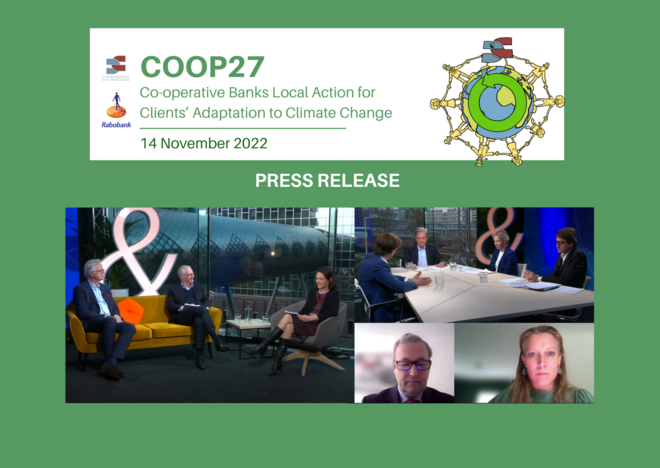Co-operative banks make assessments of climate risks and reaffirm their commitment to support economic sectors impacted by climate changes during the event "COOP 27: Co-operative banks local action for clients' adaptation to climate change", organised by the European Association of Co-operative Banks (EACB), in collaboration with its members Rabobank (NL). Taking place in the context of the UN COP27, the event is the opportunity for the EACB and its members to highlight the role co-operative banks can play at local level to increase the resilience of economic sectors affected by concrete consequences of climate change. On this occasion, the EACB releases five postulations for policy makers and regulators.
In continuation with the COOP26 event, the attention for this edition was on the reactions to the phenomena that are already currently occurring with tremendous consequences for economies and productive sectors. The EACB event aims to spotlight the role of co-operative banks in fostering climate adaptation actions and possibilities for more cooperation between various sectors.
Co-operative banks stand ready to provide finance for net zero transitions and to local businesses investing in measures to become more climate resilient by adapting to physical risks. For the economy and our society, it is imperative to take action while aligning with the 2050 Paris Goals. Together, the public authorities and the banking sector can get there. However, to be able to do so, banks need better regulation of the economy when it comes to climate, clear requirements for business sectors, and access to climate data.
During the initial fire-side chat, Nina Schindler, Chief Executive Officer of the EACB, facilitated a fruitful fire-side chat to identify the challenges ahead and the role that public and private authorities shall play.
Berry Marttin, President of the EACB, underlined: “We are on a journey, and we are continuously learning about the climate-related risks and the opportunities to increase resilience, together with our clients and stakeholders. To successfully address climate change we not only have to take action ourselves, but we also need clear and workable regulation, access to climate and ESG data and a level playing field for business. Climate adaptation is justifiably receiving more and more attention, just which is pivotal in achieving a net zero economy."
Peter Glas, Dutch Delta Commissioner said: “The financial and physical world are here today around a table. I really hope that the financial sectors and cooperative banks in particular could become the game changer, accompanying economic sectors in this transition. We need to understand that, against climate change, stakeholders, institutions, public authorities, the private sectors and regulators must be on the same side of the rope, pulling harder together and helping each other not to lose the battle. Scenario analyses are very important to assess climate risks. We believe that any forward-looking risk analysis should be based on updated data and should take into account all the actions already taken to mitigate the risks in certain specific areas”.
The panel discussions gave the floor to high-level representatives from the European Central Bank (ECB), the co-operative banking sector and outstanding representatives from companies operating in the most impacted sectors.
By maintaining close relationships with their clients and providing financial services to consumers who want to make their homes and local communities more sustainable, co-operative banks can help to make the local and region climate transitions successful.
Companies, research institutes, banks and other financial institutions, governments, customers, and all stakeholders must work well together in order to achieve the climate goals and sustainability transitions. None of us can do it alone, and we can leave no one behind. The co-operative banking sector certainly wants to play its part and it will continue to work on the identified priorities.



